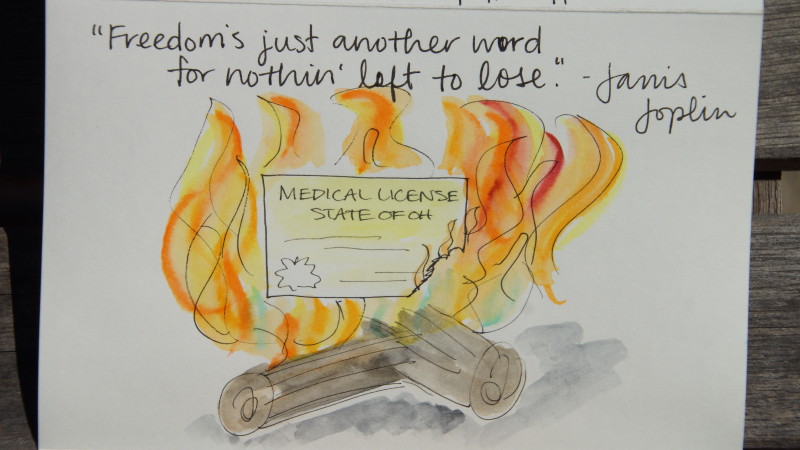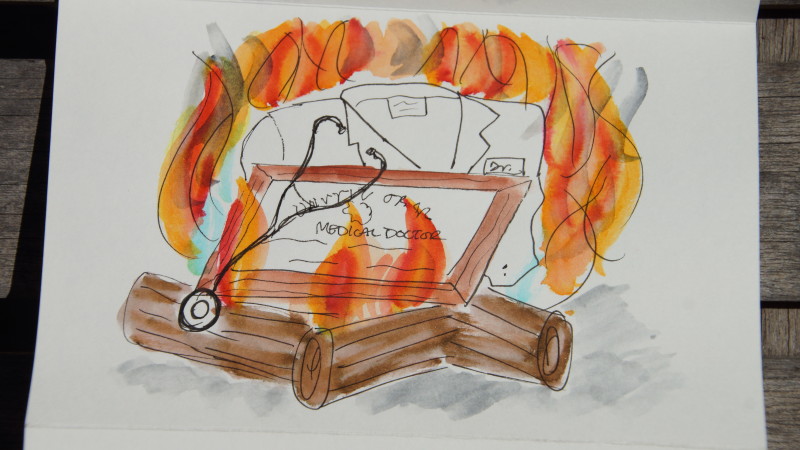It has been fourteen years since I graduated from University of Michigan Medical School. I have journeyed far from the field of medicine, and yet my heart keeps hearing the call to return to my physician communities and share what I have learned. I simply cannot ignore my sense that the pain within our health care system - now felt at every level, including patients, physicians, and payors - is a resounding call to wake us up to our next stage of evolution.
It takes only a cursory scanning of the headlines of medical blogs like this one to get a sense for the unrest, the frustration, and the abundance of innovative practices emerging as a result of the rising sense of powerlessness among doctors. I left medicine immediately after receiving my MD, moving into uncharted waters after the Dean of Career Development at Michigan told me, "You're on your own. We can't help you with that." This was when, as a fourth year student, I announced I would be pursuing a career in venture capital.
I volunteered at a private equity investment firm - yes, I worked for no pay - and six weeks later, I was hired as an Associate. Within two years I was the youngest partner-level Investment Manager in the firm. No one told me this was possible. I simply would not accept anyone else's opinion of what I could or could not do. Especially after what I witnessed in my world of medical training.
One of my most vivid memories was on my Vascular Surgery rotation, where I was absolutely loving the concept of what we were doing - as intellectual masturbation material. But in practice, what I saw was my future laid out in the following scenarios. The second year resident, sick as a dog, showed up to work anyway, and, too weak to stand, lay down on a gurney in the OR while a case was going on. The third year vascular surgery fellow, a gentile Southern man, was in the middle of a lower extremity bypass graft and stepped out of the room. He lifted his mask, vomited into the scrub sink, and then reentered the OR to continue the procedure. This happened two more times within the same procedure before he completed.
Many of you reading this may be nodding and saying, "Yup. That's just the way it is. Suck it up or leave it." And my question is, "If you have trained yourself not to feel, what else might you be missing in your experience of other people?".
Later in the month, on a Saturday night call, we brought Mrs. X into the OR at about 10pm. This was hospital day 50-something for her. She had come in for a routine renal artery stent, and apparently had embolized into her IMA, killing off part of her gut. Her wound was infected, she developed multi-organ failure, and was kept alive, with an open abdominal incision, on a ventilator. She was unresponsive, and it was unclear, each day of the month we rounded on her, whether the family was aware of her prognosis. One day I spoke to her husband, and he told me, glossy-eyed, that the day before she was admitted to the hospital, they had played tennis together. He looked forward to the day they could do this again. What a far cry from the rigid piece of meat that was plugged into machinery and called "alive". I was confused, then, when we suddenly decided to bring her back to the OR to "drain her abdomen" or do something surgical, when there was no clinical evidence of any change in her status.
I will never forget the first snipping of the sutures holding her abdominal fascia together, as a wave of black liquid gushed out of her belly. We tried to catch some of it in a test tube to "send it for culture". As if we couldn't predict the lab report of "multiple anaerobic organisms not otherwise specified". Then, at around 11pm, our 63-year-old attending vascular surgeon walked in. He had street clothes on, and held a mask over his face. He leaned about ten degrees in over the body and said, "OK, I'm signing off". Then walked out.
We were left with closing her up, bringing this woman - not just a body - back to the ICU, and coming up with a story in our notes about what we did and why.
I moved on to a different rotation before she was ever pronounced dead. I wasn't there when someone had to break the news to her husband that they would never play tennis again in this lifetime. But I internalized a lesson in that month about the price of actually DOING what I LOVED. A door inside my heart closed, believing that my heart's desire - to do a job I loved, and to live a LIFE I loved - was simply not possible. I had to choose one or the other.
Since then, I have been a partner-track professional in a venture capital firm (again, something I was told would not be possible given my experience), I moved to California to follow my childhood dream of starting a violin school, built a successful six-figure business on my own from scratch, and then experienced the loss of that school through what I now see was burnout.
The gifts of burnout have been the rediscovery of my humanity, my desire, my creativity, my purpose, my own healing, and my love. I love empowering people and being co-empowered in relationships. I love seeing my ideas in action. And I love being the facilitator of true healing and transformation in people.
I have created a life in which I do what I love, and I am fully supported in the very uniqueness of my expressions of love. I have received trainings in life coaching, sound healing, traditional Thai massage, Breema bodywork, and Bio Optic Holography. I made a conscious transition from playing only classical music for thirty-plus years to improvising on my violin, voice, and other instruments. I co-created an acoustic rock duo with my partner-in-life, and we perform in public regularly. We live in a beautiful natural setting, among a community of people who value artistic expression, stewardship of the earth, and mutual support. I birthed myself as a visual artist, and have exhibited in a juried show during my first year as a painter. I have traveled the world and studied with the most inspiring people I have ever met in my life. And I share this with people, one-on-one, in groups, by phone and face-to-face.
I have avoided sharing the fullness of my learnings with physicians, other than those who happen to find me in their own internet searches. I have been hiding my joy. And now, even as I feel my fear of wading into shark-infested waters, I choose to bring my message to you. It is not necessary to settle for what others have told you is possible, or even for what you have defined in the past as possible. You are a creative force far beyond your current imagination.
I have followed the public and academic discourse on physician burnout and suicide, and I notice several things. First, the good news. It's being discussed and therefore legitimized as a "syndrome" in the eyes of the medical establishment. Not surprisingly, however, burnout is being "medicalized" as a diagnosis that must be prevented, eradicated, treated aggressively, and fought like a battle against a raging enemy among us. This is the medical mindset. It's how we were all trained to see the world - to focus on what's right and wrong, eradicate the wrong, and restore the system to its previous state if at all possible.
I have a different perspective. I see the experience of burnout not as something to be eradicated, shamed, attacked, or avoided, but as something to experience with full participation and curiosity. To see the depths of despair and loss as a form of structural tension within a system that holds great innate latent potential to launch a powerful trajectory in the direction of your greater mission in life. Yes, I believe your personal, specific experience of burnout holds the very keys to the fulfillment of your wildest dreams and desires for your thriving life.
Fundamentally, the process is one of remembering your love. Remembering your art. Remembering YOUR medicine. And LIVING YOUR MEDICINE. Yes, that means looking at yourself. Shining loving light - transcending right and wrong - on those experiences within you that require healing attention. When you have walked with courage through your own healing process, and you have touched the places within you that you did not understand how to love previously, you become your medicine. You embody the grace of healing, and you effortlessly deliver the level of care, compassion, and precision that flows through you as love.
If your heart says YES, please join me for a free introductory call to my new program for physicians, "Live Your Medicine", by registering here. Vote for your own joy, creativity, and desire by taking a courageous step on behalf of your own heart. And please reach out to any colleagues you know who may benefit from this discussion.

 I recently returned from a week-long stay in Keystone, Colorado. I was there with a small group of physicians gathered to restore their voice to the practice of medicine.
I recently returned from a week-long stay in Keystone, Colorado. I was there with a small group of physicians gathered to restore their voice to the practice of medicine.
